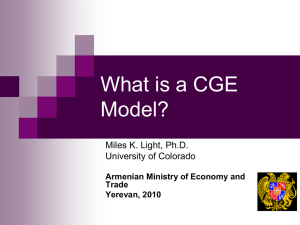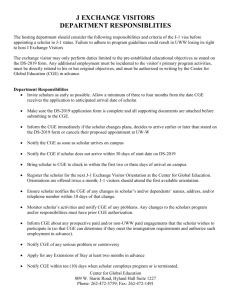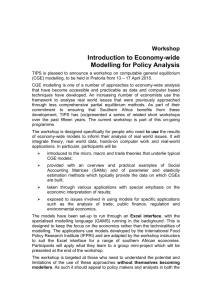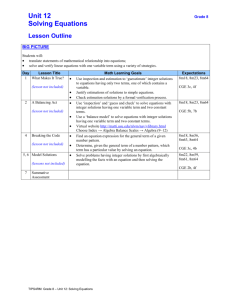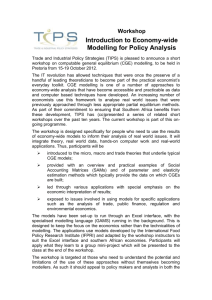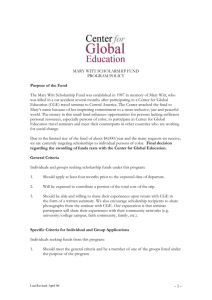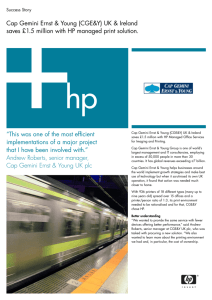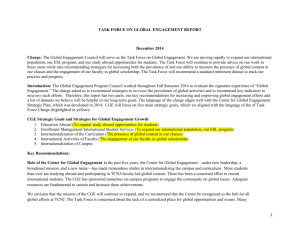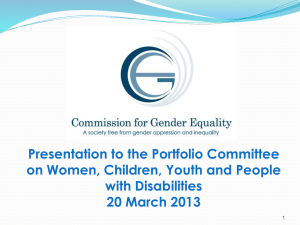Commission for Gender Equality
advertisement
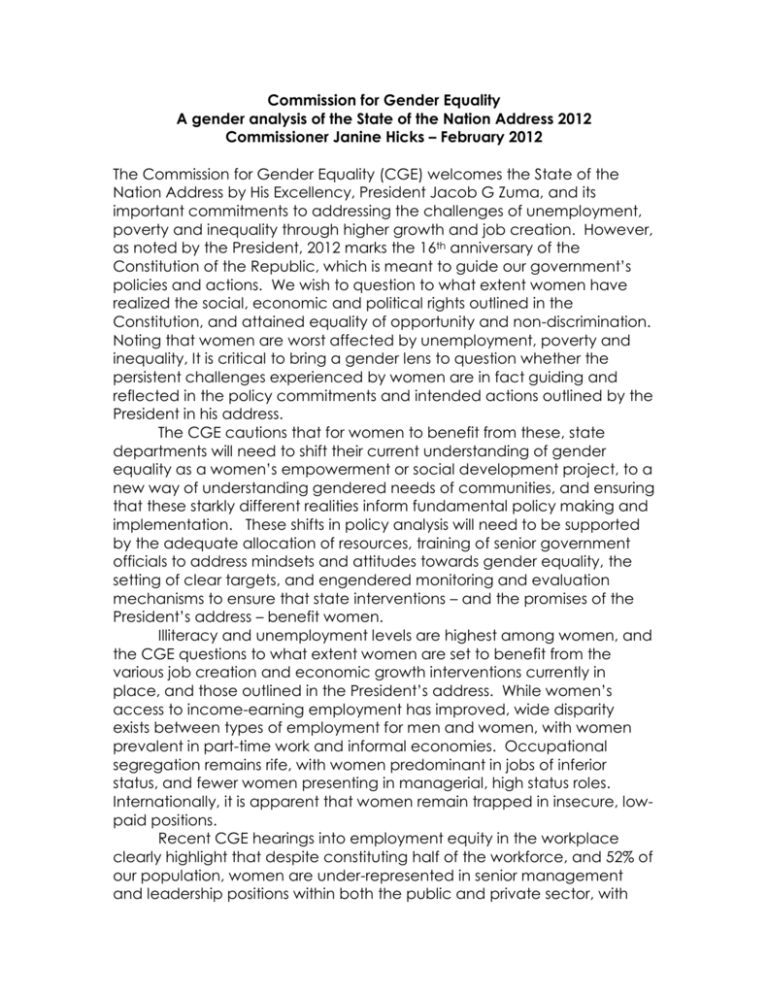
Commission for Gender Equality A gender analysis of the State of the Nation Address 2012 Commissioner Janine Hicks – February 2012 The Commission for Gender Equality (CGE) welcomes the State of the Nation Address by His Excellency, President Jacob G Zuma, and its important commitments to addressing the challenges of unemployment, poverty and inequality through higher growth and job creation. However, as noted by the President, 2012 marks the 16th anniversary of the Constitution of the Republic, which is meant to guide our government’s policies and actions. We wish to question to what extent women have realized the social, economic and political rights outlined in the Constitution, and attained equality of opportunity and non-discrimination. Noting that women are worst affected by unemployment, poverty and inequality, It is critical to bring a gender lens to question whether the persistent challenges experienced by women are in fact guiding and reflected in the policy commitments and intended actions outlined by the President in his address. The CGE cautions that for women to benefit from these, state departments will need to shift their current understanding of gender equality as a women’s empowerment or social development project, to a new way of understanding gendered needs of communities, and ensuring that these starkly different realities inform fundamental policy making and implementation. These shifts in policy analysis will need to be supported by the adequate allocation of resources, training of senior government officials to address mindsets and attitudes towards gender equality, the setting of clear targets, and engendered monitoring and evaluation mechanisms to ensure that state interventions – and the promises of the President’s address – benefit women. Illiteracy and unemployment levels are highest among women, and the CGE questions to what extent women are set to benefit from the various job creation and economic growth interventions currently in place, and those outlined in the President’s address. While women’s access to income-earning employment has improved, wide disparity exists between types of employment for men and women, with women prevalent in part-time work and informal economies. Occupational segregation remains rife, with women predominant in jobs of inferior status, and fewer women presenting in managerial, high status roles. Internationally, it is apparent that women remain trapped in insecure, lowpaid positions. Recent CGE hearings into employment equity in the workplace clearly highlight that despite constituting half of the workforce, and 52% of our population, women are under-represented in senior management and leadership positions within both the public and private sector, with both state and private sector entities failing to reach state targets and employment equity provisions. The CGE welcomes the proposed introduction of the Women Empowerment and Gender Equality Bill to leverage greater accountability for non-compliance with equality provisions. In his address, the President outlines higher growth and job creation as key solutions to the challenges facing South Africa. However, the state’s response in the form of the New Growth Path framework is appallingly gender blind, with no reference to the situation and role of women in growth planning and implementation, and in the economy generally. This reflects the persistent failure of state institutions to engender key policy frameworks, by failing to conceptualise and integrate gender equality, and the particular vulnerabilities, situation and needs of women, in its overarching policy and planning processes. The CGE has to ask: where are women in the new jobs referred to in the President’s address? To what extent have women benefited from the Job Fund and the promotion of access to loans? The formal sectors referred to, such as infrastructure development, industrial projects and mining, are often referred to as “scarce skills” sectors, where women are grossly under-represented in finance, technical and engineering categories of employment. CGE hearings reveal that this is occasioned by a diverse set of factors, ranging from outright discrimination in employment practices, persistent gender stereotypes about women’s potential in the workplace, and insufficient interventions to encourage girls and women to study for and pursue careers in these sectors. CGE recommendations identify proactive measures that should be put in place by employers to build the pool and skills of women in this sector, through for instance designated bursaries and learnerships, and confronting discrimination in the workplace. In addition, there is inadequate reference in the New Growth Path to supporting women-owned small businesses. These comprise the backbone of family incomes and the local economy, yet there is inadequate provision of business management training for women in this sector, enabling access to finance, or ensuring that Broad-based Black Employment Equity measures and state procurement opportunities benefit women-owned small businesses. The infrastructure developments outlined in the President’s address, in the form of ensuring increased access to water, sanitation, electricity, housing and transport are likely to improve the quality of life of women, and are to be welcomed, yet women – who are adversely affected by lack of access to such resources – are invisible in planning processes, leadership structures of related community processes, and in the procurement of contracts. In addition, the CGE is concerned that the state’s ongoing failure to implement gender mainstreaming of their programmes and budgets will not bring about equal access to these resources. The CCE welcomes the President’s commitment to ensuring sustainable, clean energy sources, such as biofuels and solar energy, as these have the potential to liberate women from the demands on their economically productive hours and health hazards associated with harvesting and using dirty and non-sustainable energy sources. The CGE recommends that the Presidency takes concrete steps to ensure that women-owned businesses and organizations are included in the proposed Presidential infrastructure summit, to ensure that opportunities and challenges facing women are surfaced and addressed in the resulting plan. The CGE further welcomes the universal primary education enrolment rates attained by the state, and the implementation of no-fee schools and school feeding schemes, all of which contribute towards securing girl children’s access to education. Nonetheless, the CGE warns against focusing purely on school enrolment figures, as opposed to attendance, as this conceals the impact on girls of gender-based violence at schools, the burden of the gendered nature of domestic chores, access to sanitation at schools, and teenage pregnancy, causing them to drop-out of school at unacceptable rates. These require tailored policies, interventions and budgets to ensure girls’ right to education is not compromised. While the reduction in reported serious crime is welcomed, the CGE notes that state failure to ensure the effective implementation of key legislation such as the Sexual Offences Act and Domestic Violence Act, through its current inadequate training, resourcing, reporting and oversight, throws into question the extent to which gender-based violence is being addressed. Finally, the CGE cautions that women’s access to land needs to be surfaced in policy and planning responses. While the President’s address notes that only 8% of the state’s target of land redistribution has been attained, CGE research reveals that men constitute 90% of land reform beneficiaries, revealing the age-old non-recognition of women’s title to land. This needs to be clearly addressed in the state’s response to land reform, to ensure women’s security of tenure, provide a counter to women’s poverty, and enable women to establish a firm foothold in the country’s economy. The CGE congratulates His Excellency President Zuma for delivering an address that speaks to the key societal and developmental challenges impacting on women, and calls upon state departments to ensure that in their policy and programmatic responses they surface and eliminate the entrenched inequality and discrimination impacting on the quality of lives of women. The promises outlined for the nation in the President’s address need to be enjoyed by the majority of South Africa’s population.

